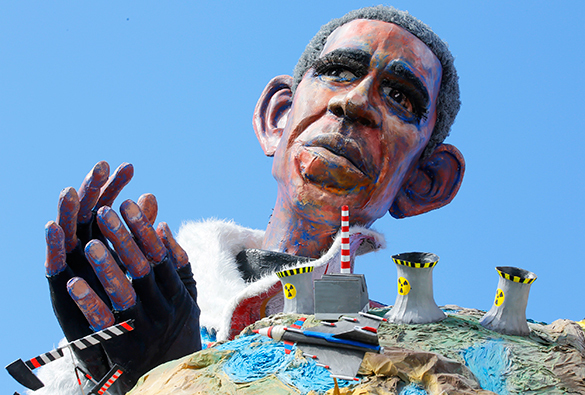Francis Boyle: Brzezinski wants to break Russia up into constituent units
Pravda.Ru interviewed Francis Anthony Boyle, a professor of international law at the University of Illinois College of Law about the current politiclal situation in the world. We asked the professor to comment on whether the crisis between Russia and the West is as dangerous as it seems to be.

How do you assess new Minsk negotiations on the political settlement of the conflict in Ukraine?
It's very difficult, what concerns me it is that the ceasefire it is not go into place until Sunday, and today is Thursday, any thing could happen between now and then, I think that it's very important we've signed this agreement, hopefully it will head off President Obama's determination to sent lethal military equipment to Ukraine. So, from that perspective it's good, but the problem is the implementation, that's what really concerns me right now.
Do Europe and the US still have similar views on the situation?
I think if you read the terms of the settlement, the official document is not out, but back to the Minsk agreement basically which was based on President Putin's peace proposal, and I think it has the framework there, peaceful settlement of this view, obviously there are disagreements of interpretation on both sides. I think it really depends on whether President Obama is going to read the riot act to President Poroshenko and tell him that he should implement this agreement in good faith. It also concerns me that in March next month President Obama is sending a 300 special forces to Ukraine to train not just the military, but these neo-Nazi paramilitary formations. That's not a positive sign at all, I wouldn't say it's a deal breaker. So, that's my assessment it really depends on Obama telling Poroshenko to negotiate the details here in good faith. I do believe that President Putin here has negotiated in good faith, I do not believe President Putin has any interest in annexing Donbass or anything like that, and I think if there is to be a settlement, there can be a settlement, but it really depends on President Obama and what he wants because Poroshenko does whatever President Obama tells him to do. It's that simple. I also think it's a positive sign that the leaders of Donbass have signed down to this agreement. I think that's a very positive sign. So, I guess we'll see what happens here next 3 or 4 days, I don't know.
What was Angela Merkel convincing Barack Obama of during her visit to the US?
Obviously it appears that she and President Hollande had two objectives. One - as you know the Debaltsevo now is surrounded and if a ceasefire is not in place soon, it could fall and create very serious circumstances in all sides leading to escalation. Secondly, it's clear if you read her coming here into the United States, her appearance at the press conference, she did not support any plan by the neoconservatives here in the United States to provide lethal weapons to the government in Ukraine, and as I also pointed out if you have a look at the bill introduced in the Congress recently - they were not only to supply lethal weapons to the military of Ukraine, but the so-called national security forces which means the National Guard, Right Sector and all these Nazi, neo-Nazi paramilitary formations, they are going to arm them which is mind-boggling that they will arm these people. So, I believe Chancellor Merkel came over here to get some time from President Obama to see if she and president Hollande could produce this agreement with President Putin, which they did, so at this point, I don't think there's any excuse for the United States to be arming or threatening to arm even the military or these Nazi formations in Ukraine. So, from that perspective I think she and President Hollande have accomplished their objective. I personally would prefer immediate ceasefire right now upon the agreement itself.
Isn't it time to deviate from such terms as "separatists", not to regard them as "terrorists", but as full members of peaceful settlements?
This is the whole problem, how can there be a reasonable good faith negotiations when Poroshenko and his gang of Nazis in Kiev are claiming his own citizens are terrorists? It's preposterous and dehumanizing them. But again the leaders of Donetsk and Lugansk were there, they did sign onto this agreement. It does appear that, at least according to the press accounts, I haven't seen the final documents yet, that Poroshenko has agreed to some type of decentralisation in Donbass. Now President Putin has called for federalization, obviously negotiations can occur within that framework of references, what is decentralization versus federalization, I think lawyers can sit down and work that out and deal with that if there's good faith, but of course you can not here Poroshenko and Yatsenyuk calling Russian-speaking Ukrainians 'terrorists' in expect any type of peace settlement here, that is going to have to stop, they will have to recognize that they are regular citizens of Ukraine and also that they speak Russian, their Russian language rights will have to be respected for sure.
Why is the West convinced that Russia can be broken down with the sanctions?
I regret to say what we are seeing here in the Unites States are the ascendancy of two factions in this country who are against Russia and the Russians. First is Brzezinski, who was Obama's mentor when Obama was a college student in Columbia, and Brzezinski in 2008 ran all the foreign affairs and defence policies of the Obama presidential campaign and has stacked his administration with advisor on Russia at the National Security Council comes from the Brzezinski's outpoll CSIS there in Washington D.C. I graduated from the same Ph.D. programme at Harvard that produced Brzezinski before me.
He is a die-hard Russian hater, he hates Russia, he hates the Russian, and he wants to break Russia up into its constituent units, and, unfortunately, he has his people, his proteges in the Democratic Party and in this Administration. Second faction lining against Russia are the neo-conservatives, for e.g. this latest Brookings Institute report calling for arming the Ukrainian military in these Nazi formations which is now reflected in this latest bill just introduced into the Congress yesterday, and the neoconservatives feel exactly the same way against Russia and the Russians.
I went to school with large numbers of these neoconservatives at the University of Chicago, Wolfowitz and all the rest of them. Many of them are grandchildren of Jewish people, who fled the pogroms against Jews, and they have been brainwashed against Russia and the Russians. So you have two very powerful factions here in the United States against Russia and the Russians who are driving this policy, and I regret to report there are very few voices opposing this.
So in my assessment, the situation this is the dilemma that confronts Russia today, that confronts President Putin and it also certainly confronts me having gone to school with most these people both at Chicago and Harvard and opposing them for a generation, and all peace-loving people in America that somehow here in the United States we are going to have to figure out a way to reign these people in to avoid the direct military confrontation between Russia and the United States that very well could occur if things get out of control there in Ukraine. So it's an extremely dangerous situation for both Russia and the united states. There's no question about it. I haven't seen any thing this dangerous in my lifetime since the Cuba missile crisis that I personally lived through the 1962 and it inspired me to spend ten years in studying the Soviet Union Russia at the University Chicago and Harvard - two of the leading centres for training experts in this area in the United States. So it's extremely dangerous, I could not underestimate how dangerous the situation is.
Subscribe to Pravda.Ru Telegram channel, Facebook, RSS!


